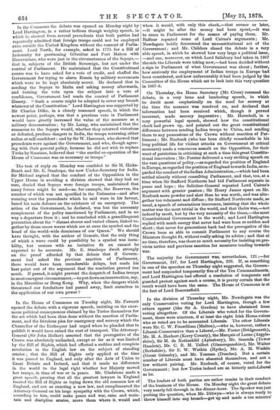On Thursday, the Home Secretary (Mr. Cross) resumed the debate,
in a very lame and lumbering speech, in which he dwelt most emphatically on the need for secrecy at the time the measure was resolved on, and declared that information had been received which, though it proved incorrect, made secrecy imperative ; Mr. Herschell, in a very powerful legal speech, showed how the constitutional check had grown up, and pointed out the great constitutional difference between sending Indian troops to China, and sending them to any possessions of the Crown without sanction of Par- liament ; Mr. Roebuck (who has been chiefly remarkable in his long political life for violent attacks on Government at critical moments) made a venomous assault on the Opposition, for their want of patriotism in criticising at such a time this great Constitu- tional innovation ; Mr. Forster delivered a very striking speech on the vast questions of policy,—as regarded the position of England in Europe, as regarded the position of England towards India, as re- garded the conduct of theIndian Administration,—which had been settled silently without consulting Parliament, and that, too, at a time when Sir Stafford Northcote had bid Parliament separate in peace and hope ; the Solicitor-General repeated Lord Cairns's argument with greater passion ; Sir Henry James spent on Mr. Roebuck more powder and shot than he was worth, and was alto- gether too vehement and diffuse ; Sir Stafford Northcote made, as usual, a speech of ostentatious innocence, insisting that the whole matter was the most trivial in the world, and that theirs was,—not indeed by merit, but by the very necessity of the times,—the most Constitutional Government in the world ; and Lord Harlington replied with much energy that never had wars been so sudden and short ; that never for generations back had the prerogative of the Crown been so able to commit Parliament to any course the Ministers thought fit, without really asking its advice ; and that at no time, therefore, was there so much necessity for insisting on pre- vious notice and previous sanction for measures tending towards war.


































 Previous page
Previous page